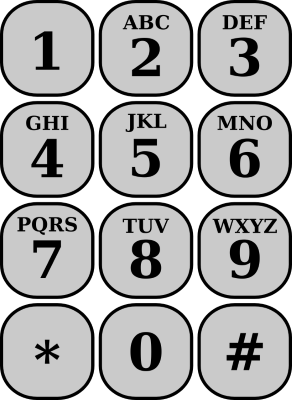For years and years the Americans have been very clever with phone numbers, using words to make them memorable, 1-800-468 3647* is quite tough to remember, but using the letters on a phone pad it instantly becomes 1-800 Hot Dogs, which is far more memorable. I also reckon that it made for quite a fight between businesses and telephone companies for the best numbers. The best we seemed to manage in the UK was the fight for “special” numbers – such as 0800 123123
And then came the mobile phone explosion, and the numbers you used were the ones handed out by your mobile phone company, there was no choice. Well, there was, but you had to hunt it down and “special” mobile phone numbers were expensive, because the providers knew the value.
For a long time, companies would display both landline and mobile numbers – and quite a few still do. However, for the last 5 years (maybe more) I have noticed that a lot of companies only use their mobile number. This is possibly sole traders and other businesses who work from home, or a home office. It enables them to easily keep business telephony separate from private. I’ve worked with many people who have 2 mobile phones, 1 for business and the other for personal calls.

But there are still people who won’t trust a company that only uses a mobile number simply because it used to shout “rogue trader” or similar, a company lacking any form of physical base.
I’ve also noticed that more and more sign written vans only have a mobile number on them, and in my opinion, this is a missed opportunity.
Why should a mobile only number be a missed opportunity?
Simply put, a mobile phone is harder to remember than a geographic number. Mainly because we are familiar with a range of geographic numbers (020 for London, 0117 for Bristol for example) and this makes them easier to remember – and the pattern is more familiar too. Especially if it’s the geographic descriptor for your local area (01793 in my case).
And this is the next benefit. If I see a tradespersons’ sign written van and it has a landline and mobile number, I’ll instantly know whether they are local to me, or “just visiting” and I’ll be far more likely to contact a local trade than one based elsewhere.
But landlines have their own issues. If you change phone providers, move from one exchange region to another or move from one office to another you may not be able to “take” your landline number with you. This means you’ll have to update websites, your Socials, letter heads, compliment slips, business cards etc. Which is a very good reason for just using a mobile number.
Is there a better way to use phone numbers?
Get an IP (Internet Protocol) phone number. An IP number is a virtual phone number. It’s not associated with any telephone exchange but is based in the Internet. You can have a physical desk phone (but you need one that’s IP Phone capable, not a cheap £10 phone from Amazon). You can use your PC/Laptop/tablet instead. Simply set up an IP Phone App and configure it correctly, have a headset and microphone (Bluetooth is great) and your “good to go”. You can even take IP calls on your mobile phone, yes really.
And, best of all, when you move location you don’t have to do anything at all. Your phone number comes with you, wherever you choose to go.
You could even get an IP phone number for the next town/city that you want to expand in to, giving you a virtual presence there and making it even easier for potential clients to contact you.
If you need help with your telephony then I probably know enough to be able to point you in the right direction and if you need assistance with your SEO, Email Marketing, Social media or any other type of online marketing activities then I can definitely help you so you really should get in touch – even if it’s just for a free consult. You can call me on 01793 238020 or 07966 547146, email andy@enterprise-oms.co.uk or book a slot using my calendar and we’ll take it from there
*(1-800 being the US equivalent of a free phone number, known in the States as a Toll Free Number)

